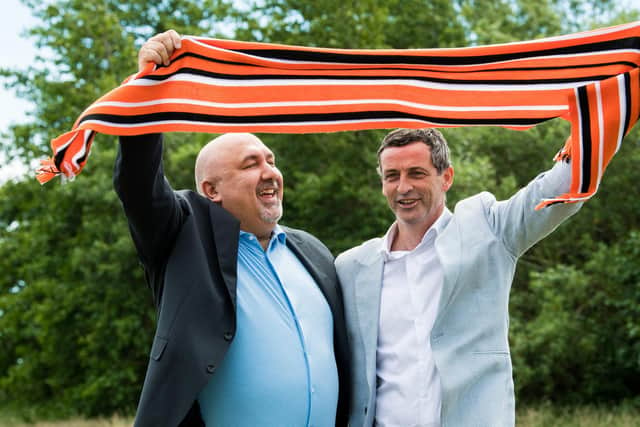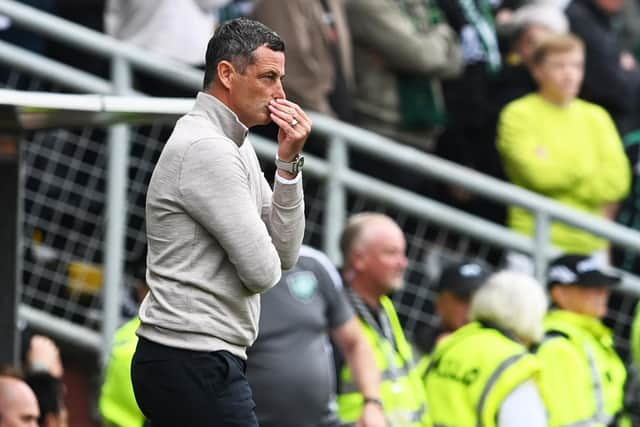Disaster at Dundee United: The 26-day collapse - no love in air in sorry saga with Ross, Asghar and players
It seems utterly implausible to think that 26 days on from that summer’s night on Tayside, United would be sitting bottom of the cinch Premiership, out of Europe after being trounced 7-0 in the return leg in the Netherlands, losing their five matches thereafter, conceding 24 goals in the process, a 9-0 humiliation by Celtic and having axed Ross from his position. The U-turn this club has undertaken would make most politicians blush.
What has happened at Tannadice is quite extraordinary. Ross, appointed back on June 20, has only lasted ten weeks in position. United clearly felt they had to act after Sunday’s catastrophic defeat, where the team was so lifeless and sapped in confidence that had Celtic made it double figures, there would have been no complaints. Managers don’t tend to recover from such apocalyptic moments.
Advertisement
Hide AdAdvertisement
Hide AdWhen Ross was unveiled in St Andrews, he and sporting director Tony Asghar spoke about a long-term project to build upon the fourth-place finish in the league last season. Turbulence had not been far from United, relegation and four different managers in four years. Robbie Neilson, Micky Mellon and Tam Courts only completed, at most, one full season each. This is a club crying out for stability.
On paper, Ross looked like a good fit, the right man to give them that: experience of Scottish football, guiding Hibs to third place and cup finals and a taste of the English game. Ross’ teams are normally built on organisation and hard work. They score goals and can play attractive football. His arrival was not met with many complaints.
The signing of veteran striker Steven Fletcher not long after was a coup, as was the permanent arrangement with last season’s star loanee Dylan Levitt. The foundations appeared to be there.
In hindsight, defeating AZ was the biggest papering-over-the-cracks job we’ve witnessed for some time in Scotland. Speaking to Ross in late July after a pre-season friendly defeat by Sunderland, while he was jovial enough, you could tell there were frustrations. Pre-season plans were not as he would have liked them, given the time vacuum between Courts’ move to Hungary and his appointment. He spoke of needing seven new players and lamented how long recruitment was taking.
Asghar has been at Tannadice since 2019 but the turnover of managers under his watch is becoming a real concern. While Jamie McGrath was clearly a player Ross wanted – he tried to sign him at Hibs – most other signings looked more likely to be Asghar and his recruitment team’s than Ross, none more so than Glenn Middleton, who Ross worked with at Easter Road and sanctioned an early termination of his loan deal back to Rangers.


Ross would have been well versed on how recruitment works at Dundee United but perhaps he overestimated the squad at his disposal. United’s fourth-placed finish last term was merited, but it was not done with much panache and they benefitted from the teams around them, none more so than Aberdeen and Hibs, underachieving massively. They relied on the individual brilliance of Levitt to drag them up the table.
The squad’s test of character came three days after defeating AZ. Scottish teams really struggle with the Thursday-Sunday turnaround so United’s 1-0 loss to Livingston was hardly a shock, but the limp nature of their performance raised eyebrows. After the annihilation in Alkmaar, the lack of guts against Hearts, conceding one minute in, set alarm bells ringing. Charlie Mulgrew spoke of soul-searching and looking in the mirror leading up to hosting St Mirren six days later but the only thing reflecting back at them was a 3-0 defeat. And then Celtic. United won’t be the last team to be given a spanking by the champions but the laissez-faire attitude of the players did very little to help their cause.
Some will argue the writing was on the wall for Ross when the squad, in between the Hearts and St Mirren matches, held a now infamous “solutions meeting”. The manager was locked out of the discussions. Against Celtic, senior players Charlie Mulgrew and Tony Watt were omitted from the starting XI and not summoned from the bench. In such a match, you often turn to experience. A schism had clearly formed under Ross, who likes to be in control and whose style clearly upset some of the long-standing squad members. He also clearly missed his usual lieutenant John Potter, who is manager of Kelty Hearts. The duo worked very well together at Hibs and Ross lacked his ally.
Advertisement
Hide AdAdvertisement
Hide AdRoss cannot be exonerated either; what a dreadful set of results he has presided over. Given he was axed by Hibs less than nine months ago, two sackings in such quick succession will not look good on the CV. Once a coach with such a bright future, it is hard to see where the 46-year-old will surface next.


Nobody comes out of this sorry divorce well, be it the club’s hierarchy, the players or the manager. Since Ross’ departure, Tony Asghar’s son Adam – who was on the coaching staff – has also left to pursue new opportunities, with his last match being the one against Motherwell on September 3.
Owner Mark Ogren, speaking in February, believes the club – currently saddled with debt – will return to profit next year. Their wages to turnover ratio rose to 132 per cent in the period to June 2021. This is an outfit that is spending big, yet paying the heaviest of price for calamity. Unless there is material change, the next manager – whoever that may be – will have their work cut out to clean up this mess.
